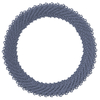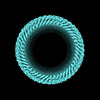[English] 日本語
 Yorodumi
Yorodumi- EMDB-24590: Cryo-EM reconstruction of Sulfolobus monocaudavirus SMV1, symmetry 6 -
+ Open data
Open data
- Basic information
Basic information
| Entry |  | |||||||||
|---|---|---|---|---|---|---|---|---|---|---|
| Title | Cryo-EM reconstruction of Sulfolobus monocaudavirus SMV1, symmetry 6 | |||||||||
 Map data Map data | sym6 | |||||||||
 Sample Sample |
| |||||||||
 Keywords Keywords | helical symmetry / archaeal virus / lemon-shaped virus / spindle-shaped virus / VIRUS | |||||||||
| Function / homology | membrane / Hypothetical membrane protein Function and homology information Function and homology information | |||||||||
| Biological species |   Sulfolobus monocaudavirus SMV1 Sulfolobus monocaudavirus SMV1 | |||||||||
| Method | helical reconstruction / cryo EM / Resolution: 3.9 Å | |||||||||
 Authors Authors | Wang F / Cvirkaite-Krupovic V | |||||||||
| Funding support |  United States, 2 items United States, 2 items
| |||||||||
 Citation Citation |  Journal: Cell / Year: 2022 Journal: Cell / Year: 2022Title: Spindle-shaped archaeal viruses evolved from rod-shaped ancestors to package a larger genome. Authors: Fengbin Wang / Virginija Cvirkaite-Krupovic / Matthijn Vos / Leticia C Beltran / Mark A B Kreutzberger / Jean-Marie Winter / Zhangli Su / Jun Liu / Stefan Schouten / Mart Krupovic / Edward H Egelman /    Abstract: Spindle- or lemon-shaped viruses infect archaea in diverse environments. Due to the highly pleomorphic nature of these virions, which can be found with cylindrical tails emanating from the spindle- ...Spindle- or lemon-shaped viruses infect archaea in diverse environments. Due to the highly pleomorphic nature of these virions, which can be found with cylindrical tails emanating from the spindle-shaped body, structural studies of these capsids have been challenging. We have determined the atomic structure of the capsid of Sulfolobus monocaudavirus 1, a virus that infects hosts living in nearly boiling acid. A highly hydrophobic protein, likely integrated into the host membrane before the virions assemble, forms 7 strands that slide past each other in both the tails and the spindle body. We observe the discrete steps that occur as the tail tubes expand, and these are due to highly conserved quasiequivalent interactions with neighboring subunits maintained despite significant diameter changes. Our results show how helical assemblies can vary their diameters, becoming nearly spherical to package a larger genome and suggest how all spindle-shaped viruses have evolved from archaeal rod-like viruses. | |||||||||
| History |
|
- Structure visualization
Structure visualization
| Supplemental images |
|---|
- Downloads & links
Downloads & links
-EMDB archive
| Map data |  emd_24590.map.gz emd_24590.map.gz | 102.8 MB |  EMDB map data format EMDB map data format | |
|---|---|---|---|---|
| Header (meta data) |  emd-24590-v30.xml emd-24590-v30.xml emd-24590.xml emd-24590.xml | 12.4 KB 12.4 KB | Display Display |  EMDB header EMDB header |
| Images |  emd_24590.png emd_24590.png | 107.4 KB | ||
| Filedesc metadata |  emd-24590.cif.gz emd-24590.cif.gz | 5.3 KB | ||
| Archive directory |  http://ftp.pdbj.org/pub/emdb/structures/EMD-24590 http://ftp.pdbj.org/pub/emdb/structures/EMD-24590 ftp://ftp.pdbj.org/pub/emdb/structures/EMD-24590 ftp://ftp.pdbj.org/pub/emdb/structures/EMD-24590 | HTTPS FTP |
-Related structure data
| Related structure data |  7robMC  7ro2C  7ro3C  7ro4C  7ro5C  7ro6C  7rocC  7rodC  7roeC  7rogC  7rohC  7roiC M: atomic model generated by this map C: citing same article ( |
|---|---|
| Similar structure data | Similarity search - Function & homology  F&H Search F&H Search |
- Links
Links
| EMDB pages |  EMDB (EBI/PDBe) / EMDB (EBI/PDBe) /  EMDataResource EMDataResource |
|---|
- Map
Map
| File |  Download / File: emd_24590.map.gz / Format: CCP4 / Size: 343 MB / Type: IMAGE STORED AS FLOATING POINT NUMBER (4 BYTES) Download / File: emd_24590.map.gz / Format: CCP4 / Size: 343 MB / Type: IMAGE STORED AS FLOATING POINT NUMBER (4 BYTES) | ||||||||||||||||||||||||||||||||||||
|---|---|---|---|---|---|---|---|---|---|---|---|---|---|---|---|---|---|---|---|---|---|---|---|---|---|---|---|---|---|---|---|---|---|---|---|---|---|
| Annotation | sym6 | ||||||||||||||||||||||||||||||||||||
| Projections & slices | Image control
Images are generated by Spider. | ||||||||||||||||||||||||||||||||||||
| Voxel size | X=Y=Z: 1.1 Å | ||||||||||||||||||||||||||||||||||||
| Density |
| ||||||||||||||||||||||||||||||||||||
| Symmetry | Space group: 1 | ||||||||||||||||||||||||||||||||||||
| Details | EMDB XML:
|
-Supplemental data
- Sample components
Sample components
-Entire : Sulfolobus monocaudavirus SMV1
| Entire | Name:   Sulfolobus monocaudavirus SMV1 Sulfolobus monocaudavirus SMV1 |
|---|---|
| Components |
|
-Supramolecule #1: Sulfolobus monocaudavirus SMV1
| Supramolecule | Name: Sulfolobus monocaudavirus SMV1 / type: virus / ID: 1 / Parent: 0 / Macromolecule list: all / NCBI-ID: 1351702 / Sci species name: Sulfolobus monocaudavirus SMV1 / Virus type: VIRION / Virus isolate: STRAIN / Virus enveloped: No / Virus empty: No |
|---|
-Macromolecule #1: major capsid protein
| Macromolecule | Name: major capsid protein / type: protein_or_peptide / ID: 1 / Number of copies: 1 / Enantiomer: LEVO |
|---|---|
| Source (natural) | Organism:   Sulfolobus monocaudavirus SMV1 Sulfolobus monocaudavirus SMV1 |
| Molecular weight | Theoretical: 16.179297 KDa |
| Sequence | String: MSVSVVVPSA KATGAGGKKA KTFKVIKVST PKVNNVHVPK IKKATRIHDP GAISGSLAKV TFGTNGFDIP TIAIALLIVG VIIGLSGLI LSIFATATAS AISNPSPGTL AYNLTHPLIN GMVSFFSFFP TLYVLLGVTG IVLIAAGIIS IIMEKFKT UniProtKB: Hypothetical membrane protein |
-Experimental details
-Structure determination
| Method | cryo EM |
|---|---|
 Processing Processing | helical reconstruction |
| Aggregation state | filament |
- Sample preparation
Sample preparation
| Buffer | pH: 6 |
|---|---|
| Vitrification | Cryogen name: ETHANE |
- Electron microscopy
Electron microscopy
| Microscope | FEI TITAN KRIOS |
|---|---|
| Image recording | Film or detector model: GATAN K3 (6k x 4k) / Average electron dose: 50.0 e/Å2 |
| Electron beam | Acceleration voltage: 300 kV / Electron source:  FIELD EMISSION GUN FIELD EMISSION GUN |
| Electron optics | Illumination mode: FLOOD BEAM / Imaging mode: BRIGHT FIELD |
| Experimental equipment |  Model: Titan Krios / Image courtesy: FEI Company |
- Image processing
Image processing
| Final reconstruction | Applied symmetry - Helical parameters - Δz: 0.66 Å Applied symmetry - Helical parameters - Δ&Phi: 153.1 ° Applied symmetry - Helical parameters - Axial symmetry: C1 (asymmetric) Resolution.type: BY AUTHOR / Resolution: 3.9 Å / Resolution method: FSC 0.5 CUT-OFF / Number images used: 107454 |
|---|---|
| CTF correction | Type: PHASE FLIPPING AND AMPLITUDE CORRECTION |
| Startup model | Type of model: NONE |
| Final angle assignment | Type: NOT APPLICABLE |
 Movie
Movie Controller
Controller















 Z (Sec.)
Z (Sec.) Y (Row.)
Y (Row.) X (Col.)
X (Col.)




















